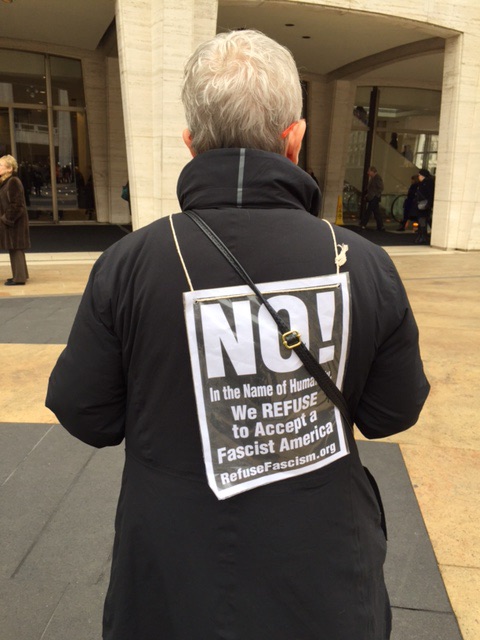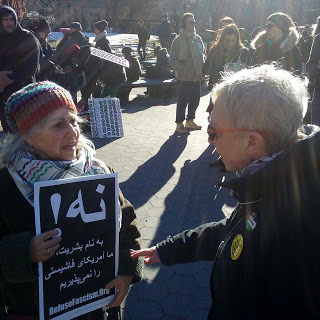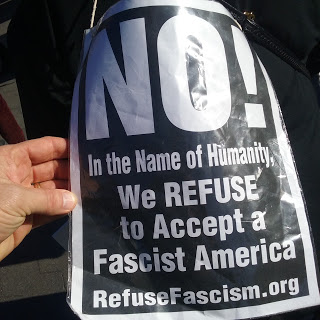Revolution Interview With Jenny Heinz on Wearing “NO!” at Lincoln Center
“This is a Time When Stands Have to Be Taken”
February 25, 2017 | Revolution Newspaper | revcom.us

Jenny Heinz in front of Geffen Hall at Lincoln Center a moment after she was escorted out. (Photo by Timothy Biel provided by Jenny Heinz)
Jenny Heinz went to a performance at Lincoln Center wearing a sign: “NO! In the Name of Humanity, We REFUSE to Accept a Fascist America—RefuseFascism.org.” At Lincoln Center she was told she would have to remove the sign to enter. She refused to remove it, and was barred from the performance. The incident was covered in a piece in the New York Times and in national media. Revolution/revcom.us spoke with her to get the whole story on why she did this, what she has to say about the situation people confront with the Trump/Pence regime, and what people need to do.
Revolution: What inspired you to wear your sign, “NO! In the Name of Humanity, We REFUSE to Accept a Fascist America—RefuseFascism.org” to Lincoln Center?
Jenny Heinz: Sometime in November, there was a press conference at the Trump Tower. It was before the inauguration even. I got that sign and I kept it and I’ve worn it ever since. I’ve worn it every single day. I’ve gone to the Metropolitan Opera, Carnegie Hall. I wear it on the way to work and then I take it off so clients don’t see it. But basically, I have been wearing it ever since, everywhere I’ve gone. I don’t remember when those signs came out, I think in November, when Refuse Fascism came out. I especially liked “In the Name of Humanity.”
Revolution: Talk a bit about why you see the urgency to make the statement you’re making.
Jenny Heinz: I’ve been wearing an IS IT FASCISM YET button since 2003, and basically it’s been a powerful way to connect to others. It was clear to me that under Bush the signs of increasing corporate control were taking on the face of fascism. And so people often reacted to my button with “No, not yet.” And that allowed me to engage well, what, if it’s “not yet” at what point do you say “it is”? Those kinds of encounters are taking place more and more as people begin to get that is what is going on. We need to disrupt a person’s consciousness as they go shopping. So when I saw the sign, I thought that would be perfect for my back because it feels like increasingly we have to use our bodies, especially since the media over the years has been so corporate and not sufficiently functioning and now they are really under attack by the Trump regime.
So I really feel like even if it makes me look crazy in a way—I’ve got a button on the front and a sign on the back. Nowadays, it’s about connection. And people come over to me, or on the subway speak to me and yearn to engage. And it’s about having discussions. It starts conversations with people walking down the street. So in a way it’s critically important and very useful and helpful because at a time like this we have to have connections to one another. That’s what resistance requires really. Support the connections so we can do what we need to do over the long haul.
Revolution: When you wore this to Lincoln Center you weren’t allowed inside with it. Can you talk about the impact of that?
Jenny Heinz: Well, what happened was I was just going to a Sunday concert. And in the previous weeks I’d been to concerts, and to Carnegie Hall and to the opera, and I wore the sign on my back. On this day, I walked onto the plaza, and went to exchange my ticket. I was hanging around there after I exchanged my ticket, and about 20 minutes later security came over to me and said that I had to remove the sign, which I refused to do. And then the two security guards were basically telling me that I couldn’t go in. And I said I’d like to speak to a higher-up or a manager. And that’s when someone finally came over and I requested a refund.
By that time, I had already called [civil liberties attorney, and former executive director of the New York Civil Liberties Union] Norman Siegel. I called and said I was being stopped by security. He said get their names, and I couldn’t get their names. I said to them, can you give me the number of the legal department. And after I got the refund the guy gave me the number to the legal department. So I was in the lobby still going to call Norman to give him the phone number of their legal department as he had suggested I do. As I was making the phone call, two or three security guards came over and said you have to leave the lobby and the hall, meaning lobby, and I was escorted onto the plaza.
What unfolded was basically, the next day, on Monday, Norman got in touch with their legal department. And a gentleman whom I had met on the plaza sent me an amazing email about the importance of this, and about the connection of this to culture and the arts and democracy. And the arts and cultural institutions, like Lincoln Center (who do accept money, right?), need to grapple with how are they going to respond and function in an authoritarian regime.
The other piece to know, between the time of the concert and my meeting with the higher-ups that Norman arranged with the head of operations and security, when I went to go to that meeting, I was not allowed on the plaza. So enforcement of a policy, yet to be seen, increased in the 10 days between the original incident and my meeting with personnel.


Top: Jenny Heinz (on the right) points to a RefuseFascism sign in the Farsi language.
Above: The same sign she has been wearing everywhere since November.
Revolution: For people reading this interview who are on the verge of following your example, putting a sign on, wearing it everywhere, maybe having some reservations about doing that, what would your advice to them be?
Jenny Heinz: To think through what concerns them about wearing such a message. What are they worried about, what does it mean to them, what is it that makes it hard for them to do that? And to really grapple with, OK, if they can’t do that, what can they do, if we really believe that things are as bad as we think they are. I’ve been arrested a number of times, although that’s never been my purpose, but around certain issues such as this, I’m prepared to be arrested. But not everyone is willing or able to risk arrest.
But I think people really need to think through how can they put themselves... push the envelope a little bit at a time when if you really believe what’s taking place, we each of us have to be part of the resistance, in one way or another. So I would say to people if you’re considering doing it, what are the issues about doing it? What were your concerns about?
What I’m saying is I want people to struggle. That this is a time when stands have to be taken. And so it’s what I want of Lincoln Center too. I want them to start anticipating taking their place in how they respond in arts and culture as a living organism, not atrophied as in an ivory tower.
Revolution: So talk about what happened in the aftermath of the Times article.
Jenny Heinz: I’ve certainly gotten letters from people who know me. I’m not good working the Facebook thing, but it’s been all over. Clearly AP picked it up. PEN picked it up. So did a number of different organizations. And people stopped me on the street, and said are you the person in the article? I’ve gotten positive reactions. I said to people, think what you can do. And you can do it too. I don’t proselytize that. My issue really is what can people do, and to impress upon them that I think each of us can do a lot and need to! Resistance is what we must be part of every day in whatever way we can. Times are dire and we each need to be part of resisting the ever increasing pace of this fascistic takeover. And to be public about our refusal in the name of humanity to accept a fascist america―hence wearing the sign as an act of expression.
Volunteers Needed... for revcom.us and Revolution
If you like this article, subscribe, donate to and sustain Revolution newspaper.
